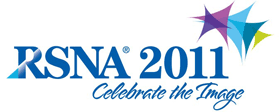
Abstract Archives of the RSNA, 2011
Marjolein Leeuwenburgh MD, Presenter: Nothing to Disclose
Bart M. Wiarda MD, Abstract Co-Author: Research grant, Siemens AG
Sebastiaan Jensch MD, PhD, Abstract Co-Author: Nothing to Disclose
Patrick M. M. Bossuyt PhD, Abstract Co-Author: Nothing to Disclose
Marja A. Boermeester MD, PhD, Abstract Co-Author: Nothing to Disclose
Jaap Stoker MD, PhD, Abstract Co-Author: Nothing to Disclose
To estimate the diagnostic accuracy and interobserver agreement in detecting acute appendicitis on MRI with expert and trained radiologists.
In this multicenter study, patients with clinically suspected appendicitis were prospectively included at the emergency department of six hospitals. MRI (HASTE, HASTE SPAIR and DWI) was performed in all patients and read by a panel of two expert radiologists (>500 MR abdomen) and by trained radiologists (training consisted of 100 cases with feedback). MRI results were not used for patient management. An expert panel consisting of two surgeons and one radiologist assigned a final diagnosis based on all available information, including 3-months follow-up, except MRI findings. Estimates of MRI sensitivity and specificity were calculated with corresponding 95% confidence intervals, by comparing the MRI results to the final diagnosis assigned by the expert panel. Furthermore estimates of interobserver agreement between expert and trained radiologists were calculated using kappa statistics.
Between March 2010 and September 2010, 230 patients were included; 223 patients underwent MRI according to the study protocol (mean age 38 years, 41% male). The expert panel identified acute appendicitis as the final diagnosis in 117 of 223 patients (52%). The estimated sensitivity, and specificity of the MRI for the expert radiologists was 0.97(95%CI: 0.92 to 0.99) and 0.93 (95%CI: 0.87 to 0.97). The trained radiologists reached a sensitivity of 0.91 (95%CI: 0.84 to 0.95) and a specificity of 0.84 (95%CI: 0.76 to 0.90). Specificity was significantly lower for the trained radiologists (p=0.02) but sensitivity was not (p=0.07). Trained radiologists and experts agreed in 88% of cases (kappa 0.76).
The diagnostic accuracy of MRI for acute appendicitis is high. Experts and trained radiologists showed a considerable level of agreement, with comparable sensitivity but higher specificity in experts.
This study showed that the diagnostic accuracy of MRI in detecting acute appendicitis is high in expert readers. Radiologists showed good interobserver agreement with the experts after training.
Leeuwenburgh, M,
Wiarda, B,
Jensch, S,
Bossuyt, P,
Boermeester, M,
Stoker, J,
Diagnostic Accuracy of MRI in Adults with Suspected Acute Appendicitis. Radiological Society of North America 2011 Scientific Assembly and Annual Meeting, November 26 - December 2, 2011 ,Chicago IL.
http://archive.rsna.org/2011/11014574.html

